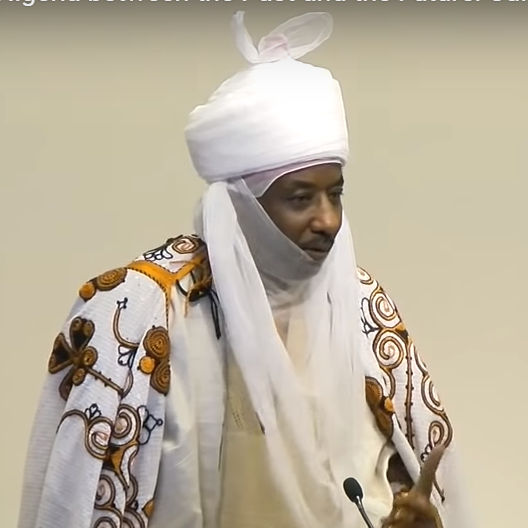The Emir of Kano and former Governor of the Central Bank of Nigeria (CBN), Muhammadu Sanusi II, has cautioned ministers and presidential aides against becoming praise singers instead of providing honest and constructive advice capable of rescuing Nigeria’s struggling economy.
Sanusi gave the warning on Monday in Abuja at the Oxford Global Think Tank Leadership Conference and Book Launch, where he and Atedo Peterside, founder of Stanbic IBTC Bank, examined Nigeria’s governance and economic challenges.
Speaking on integrity and courage in leadership, the Emir lamented that Nigeria’s progress continues to be hindered by sycophancy, as many public officials prioritize flattery over truth-telling.
“Our leaders listen but only to those who tell them what they want to hear,” Sanusi said. “Nigeria has too many sycophants in government. Those who speak the truth are seen as enemies of the state.”
He condemned the growing culture of excessive praise during official functions, stressing that it weakens accountability and encourages poor governance.
“You sit in a meeting and the first thing people say is, ‘Mr. President, thank you for your great leadership. God has blessed Nigeria by making you our leader.’ By the time they finish laying that foundation, it’s their advice that the President accepts,” he said.
Sanusi urged ministers and presidential advisers to speak truth to power, noting that blind loyalty remains one of the greatest threats to Nigeria’s development.
“Those who work with the President must understand that it is not in their benefit to turn themselves into praise singers,” he warned. “You disgrace yourself and the office you hold when you do that.”
Turning to the economy, Sanusi commended President Bola Tinubu’s administration for removing fuel subsidy and unifying exchange rates—reforms he described as “painful but necessary.” However, he warned that the gains could be eroded without discipline and prudent fiscal management.
“If you stop paying subsidies but continue borrowing more, it means you’ve filled one hole only to dig another,” he said. “The real challenge now is the quality of government spending and the management of revenues saved.”
Sanusi, who served as CBN governor between 2009 and 2014, blamed years of policy inconsistency and populist politics for Nigeria’s current economic woes. He noted that the same politicians who resisted subsidy removal in 2012 are now compelled to implement it.
The Emir commended Finance Minister Wale Edun and CBN Governor Yemi Cardoso for efforts to stabilize the economy but urged the government to reduce waste and demonstrate leadership by example.
“Why do we need 48 ministers? Why do we need long convoys and endless travel expenses?” he asked. “We cannot preach sacrifice to the people while living in luxury at the top.”
At the conference themed “Reimagining Leadership and Governance in a Changing Africa,” Peterside echoed Sanusi’s concerns, stressing that savings from subsidy removal must directly benefit ordinary Nigerians.
“Pain does not automatically bring gain,” Peterside said. “Gain follows only when the government eliminates waste and supports the poor.”
Both leaders agreed that Nigeria’s recovery depends not just on economic reforms but on moral renewal and accountability in public office.
“Good policy without good governance is like planting a tree and refusing to water it,” Sanusi concluded. “Nigeria’s leaders must stop surrounding themselves with praise singers and start listening to the truth, even when it is uncomfortable.”

